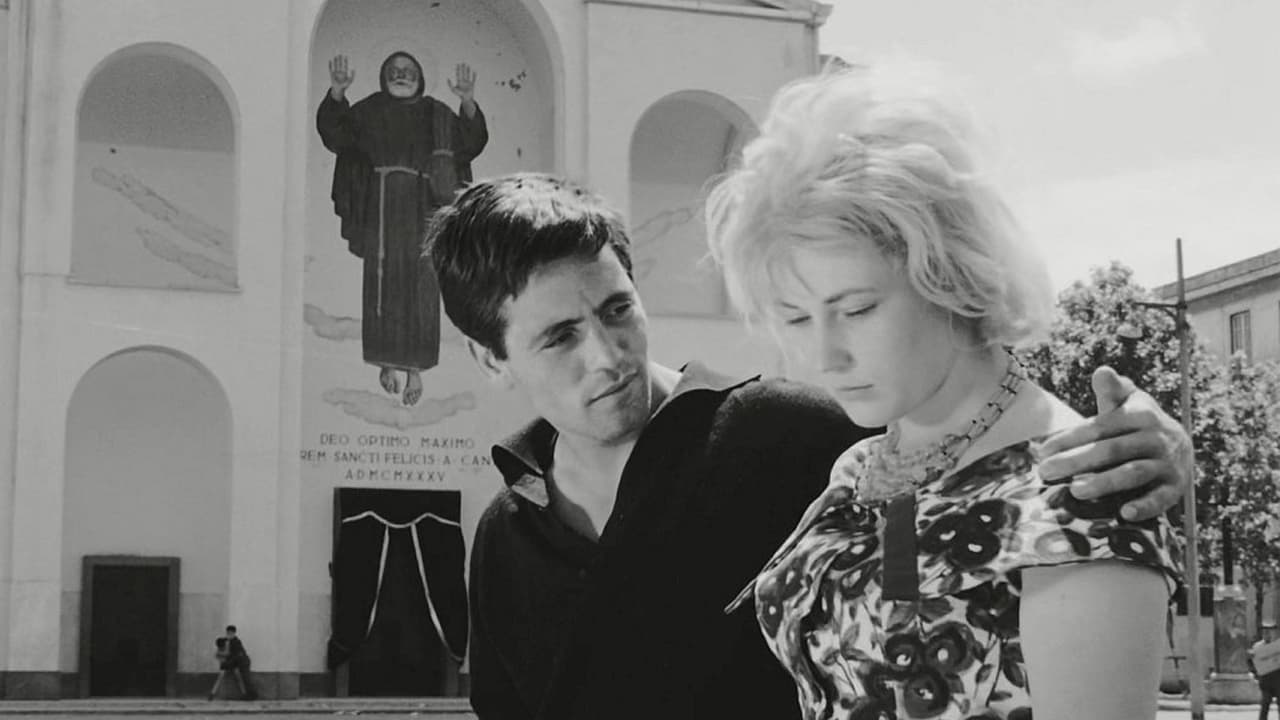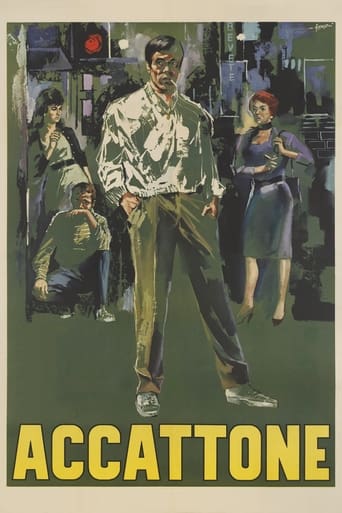



Really Surprised!
I was totally surprised at how great this film.You could feel your paranoia rise as the film went on and as you gradually learned the details of the real situation.
View MoreIt's the kind of movie you'll want to see a second time with someone who hasn't seen it yet, to remember what it was like to watch it for the first time.
View MoreIt’s fine. It's literally the definition of a fine movie. You’ve seen it before, you know every beat and outcome before the characters even do. Only question is how much escapism you’re looking for.
View MoreThis is not the Rome you see on Contiki. Pasolini has conjured up the half-life of the streets in this extraordinary movie. Accatone is a pimp and an idler, his friends are no better, and they walk Rome's emptiest streets night and day doing nothing much at all. Pasolini captures their aimless existence with his artless cinematography. Most of the dialogue is shot close up, and the cast deliver their lines with character and simplicity. It is perhaps their authenticity that makes them charming. Even Accatone is charming, despite his selfishness, idleness, resentment and occasional misogyny. They all need to be charming. In the bleak world of this movie, irony is the only defence against madness. There are moments of happiness that break through, and prevent the film from becoming monotonous or unrealistic. The beach scene near the start, and the later conversations between the tough and self-confident prostitutes, are scenes in which irony breaks out into humour, and defiance momentarily turns to content."The world will kill me, or I'll kill it!" exclaims Accatone. He struggles for redemption— but I won't spoil the end of the movie.
View MorePasollini's Accattone (1961) is a film that clearly shows the writer/director was not only uninformed, but even naive about the social situation to which his film related. This film is so detached from the slum life of the big city, and the realities of the life of pimps and prostitutes that it could better be called an example of Un-Realism, than Neo-Realism.This filmmaker couldn't even stage a good street fight, just showing two guys rolling around in the street locked in bear hugs.The protagonist's first prostitute is portrayed getting a broken leg, and is soon shown thereafter walking around with a cast on the leg, yet with no limp, or crutches. Sorry, but having a broken leg doesn't work that way.This first prostitute is shown getting badly beaten, yet then is shown in the police station without a bruise on her. Now that Neo-Un-Realism, if I ever saw it.That the protagonist is shown almost starving after his only hooker is jailed is just STUPID. Pimps are street savvy guys who have more than one girl in their stable, and are street smart enough to make money in a variety of ways besides pimping.I could go on and on, but what's the point? The costumes, the characters, and dialogue is nothing close to appropriate for the social situation that this film is supposedly portraying. This filmmaker obviously never entered the slums of a big city, and never met real pimps and prostitutes. He was making a supposedly realistic account of a social scene of which he was obviously ignorant.This is the first Pasollini film that I've viewed, and it's his first film that he made. But solely on the basis of viewing his first film, I really don't think that this guy showed enough here to merit a second chance.
View MoreAccattone is a Neo-Realist examination of slovenly irresponsibility, tastelessness and self-pity - you know, the fun stuff. Its principal characters, a group of young upwardly-immobile Roman males, are almost uniformly repulsive, a lot of chest-baring half-savages whose idea of fun is luring a whore to a deserted spot and beating her to within an inch of her life. Its hero, Accattone, is played by one of the more unpleasant actors in the history of film, a fellow named Franco Citti, who manages to single-handedly set the entire nation of Italy back about two-hundred years. It is a film of almost relentless despair, depicting a Rome so desolate and squalid, so bereft of hope, that it seems almost medieval. In the hands of almost any director the movie would be unbearable - either unbearably sentimental or unbearably grim - but with Pasolini at the helm it is merely honest.It isn't Pasolini's best film by a long way, but it may be the clearest example of what made the director so special - his ability to probe around the most revolting recesses of the human condition without seeming sensationalistic, exploitive or crass. It would be easy to go one of two directions with a character like Accattone, a lazy two-bit pimp with a son by a woman who wants nothing to do with him: the sentimental route or the grotesque. One could easily imagine De Sica, the soft-heart of Neo-Realism, turning Accattone into a sympathetic, misunderstood Everyman. And one could just as easily imagine Fellini, the most uptight director maybe in history, transforming the character into a universal symbol of societal decay. Pasolini, neither a sentimentalist nor a moralist, sees Accattone not as a sympathetic character nor as a symbol. The least judgmental director maybe ever, Pasolini conceives his characters entirely in terms of their outward behavior, and not in moral terms. He neither psycho-analyzes nor seeks to "understand" his characters. He simply presents them as they are, warts and all.It was always the purpose of Neo-Realism to present life as it was lived, not life as it was imagined by screenwriters, directors and actors, and there are few more successful ventures in this regard than Accattone. The film's main triumph is in its atmosphere. The Roman days have never seemed so sun-bleached, so arid and oppressive; its nights never so mysterious, so full of inexpressible longing (not even in Henry James). The characters seem bound to this world in a palpable way, their faces (shot by expert cinematographer Tonino Delli Colli) mirroring the desolation, the hopelessness, the strangeness of their surroundings. The movie's physicality, as always with Pasolini, is striking. But pure physical vigor, pure atmosphere isn't enough. Where Pasolini comes up short is in assembling the parts of his film into something with real emotional breadth. His first feature shows him already on his way to being a master of the image, but also shows that he had a lot to learn about being a master of cinematic rhythm. The strange blend of primitivism and modernism is already there but the command is not. It's a film that works well in the moment but feels thin as a whole. It's a triumph of Neo-Realist technique but it only half-succeeds as a film.Half-successful Pasolini is still better than the best most directors have to give. If you can portray a character as repulsive, as boorish and ego-maniacal as Accattone - a character with few if any redeeming features - for two hours without alienating your audience...well, chalk one up for the director who can do that. Especially one who manages the trick without resorting to sentimental contrivance or the kind of false significance people like Fellini always tried to drum up by filling their movies with obvious symbols, the sorts of things art-film zombies love because it gives them a chance to show their alleged smarts. Pasolini never flatters his audience but he never sneers at them either. He attempts to neither ingratiate himself with the public nor antagonize it in the manner of certain self-important avant-gardists. The best artists look for what interests them in a piece of material, not worrying whether their ideas, their approach, their style is accessible to the public at large, or critics, or scholars, or their grandmothers or anyone else. Accattone shows Pasolini on the road that would make him one of cinema's best directors - a road traveled by precisely one person, Pasolini himself.
View MorePasolini's cinematic debut tells the story of lowlife Accattone (Franco Citti, who was also in Pasolini's superior Mamma Roma), a pimp who feels full of guilt, self-loathing and other unsavory but understandable emotions. For two hours, we watch him and his buddies, see him fall in love, observe him fighting, etc. It's a string of anecdotes rather than a cohesive film. Still, there's no denying the power behind certain segments - the spaghetti sequence, for example - nor the overblown pomp of other scenes, like the one where frantic Silvana Corsini gives her vocal chords a workout while trying to convey the depths of Accattone's evil. The movie is oddly insubstantial overall - it wants to be depressing and devastating, but feels merely like a small-time obituary. It's sad, of course, but Accattone tries to hard to be really sad, affecting and all those other attributes, and comes out seeming a bit manipulative. Still, Pasolini's movie is an above-average movie, worth checking out for fans of, I don't know, pimp stories.
View More